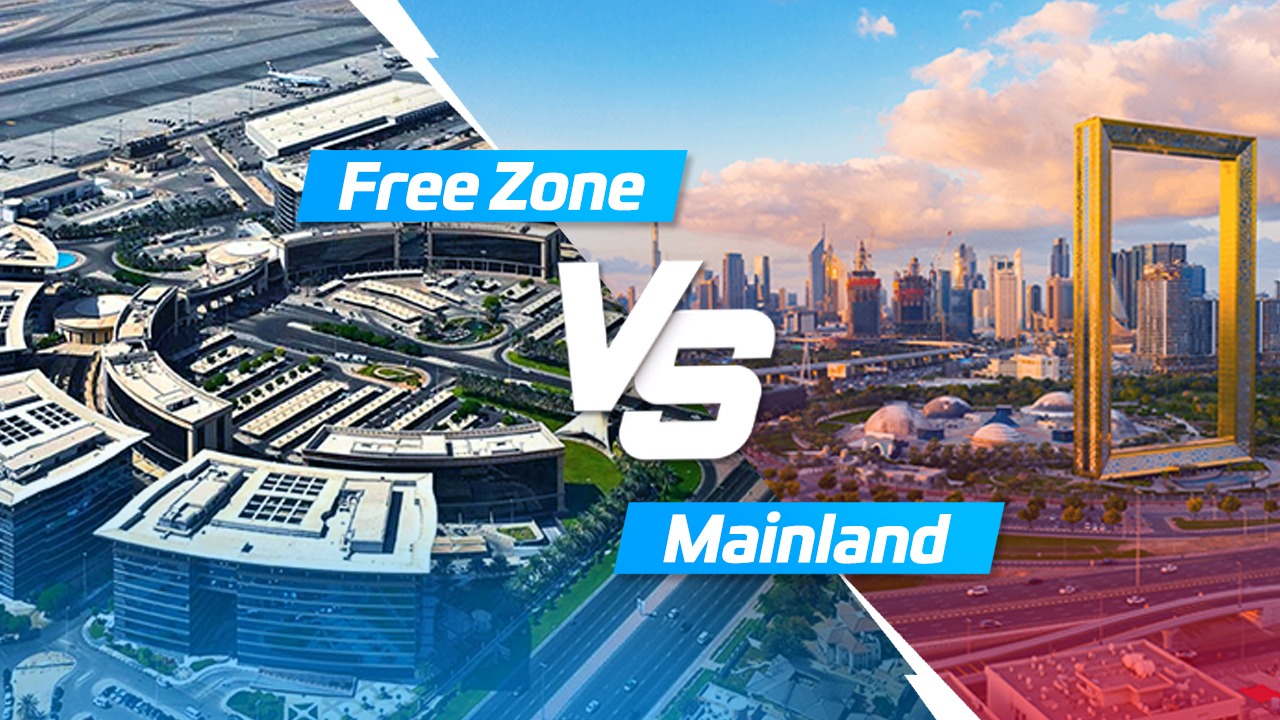The UAE is one of the most attractive destinations for entrepreneurs looking to establish their businesses due to its strategic location, world-class infrastructure, and business-friendly environment. When deciding to set up a business in the UAE, the first major decision is choosing between a free zone and a mainland company. Each option has its own advantages and limitations, and the choice largely depends on the nature of your business, your target market, and long-term goals.
In this blog, we will break down the key differences between opening a company in a free zone versus mainland in the UAE to help you make an informed decision.
- Ownership Structure
- Mainland: In the past, companies in the mainland were required to have a local Emirati sponsor who owned 51% of the business, with foreign investors allowed to own only 49%. However, the UAE government has relaxed this rule, and now 100% foreign ownership is allowed in many sectors. Nonetheless, certain strategic industries still require a local partner or agent.
- Free Zone: The most significant advantage of setting up a business in a free zone is 100% foreign ownership from day one, without the need for a local sponsor. This makes free zones popular among foreign investors.
- Business Activities
- Mainland: Companies based in the mainland can trade freely both within the UAE and internationally. They can also bid on government contracts and offer services or products directly to the UAE market. Mainland businesses also have the flexibility to open multiple branches across the UAE.
- Free Zone: Free zone companies are restricted from directly trading within the UAE market unless they collaborate with a local distributor. Free zones are designed for companies focusing on international trade or offering specific services within the zone.
- Office Space Requirements
- Mainland: Mainland companies must have a physical office space with a minimum area requirement as per the UAE’s regulations. Virtual offices or shared workspaces may not fulfill this legal requirement.
- Free Zone: Many free zones offer flexibility in office space options, from virtual offices to shared desks, and larger premises. This makes it easier for startups or small businesses to minimize costs.
- Regulations and Flexibility
- Mainland: Mainland companies are subject to UAE government regulations, such as those concerning licensing, ownership, and business operations. The advantage here is that mainland companies have greater flexibility when it comes to expanding operations across the UAE.
- Free Zone: Each free zone operates under its own regulations, which often provide greater flexibility in terms of tax benefits, business ownership, and repatriation of profits. However, expansion into the UAE mainland may require additional licensing.
- Taxation and Financial Incentives
- Mainland: Mainland businesses are now subject to a 9% corporate tax rate, introduced in June 2023, on profits exceeding AED 375,000. However, mainland businesses can benefit from tax exemptions in some industries, particularly those in specific free trade areas or sectors that receive government incentives.
- Free Zone: Free zone companies enjoy a tax-free environment, including 0% corporate and personal income tax, and 100% repatriation of profits. However, once a free zone company generates taxable income in the mainland, they may be subject to corporate tax.
- Visas and Employment
- Mainland: Mainland companies have the advantage of obtaining an unlimited number of visas for employees, depending on the size of their office space. This makes it suitable for larger operations with multiple employees.
- Free Zone: Free zones provide a limited number of visas based on office space size. For example, virtual office packages may include 1–3 visas, whereas larger offices may allow for more. Companies with high employee needs may face restrictions in certain free zones.
- Cost Considerations
- Mainland: Setting up a mainland company often involves higher costs due to office space requirements, potential need for local sponsorship, and more extensive regulatory procedures.
- Free Zone: Free zones typically offer more cost-effective business setups with attractive packages that include licensing, office space, and visa services. The overall cost is often lower compared to a mainland company.
- Scope of Business Expansion
- Mainland: Mainland companies have the advantage of operating anywhere in the UAE, making it easier to expand and open branches. They also have the flexibility to pursue government contracts and projects.
- Free Zone: Free zone companies are ideal for businesses targeting international markets or those focusing on industries like logistics, media, IT, and finance. However, direct business within the UAE market requires a mainland license or partnership with a local distributor.
Conclusion: Which Option is Right for You?
The decision to open a company in a free zone or mainland in the UAE depends on your business goals, target market, and growth strategy. If you plan to conduct business within the UAE, including government contracts and retail, a mainland setup offers more flexibility and access. On the other hand, if your focus is on international trade, online business, or specialized services, a free zone offers several advantages, including 100% foreign ownership, tax benefits, and easier setup procedures.
Before making a decision, it’s essential to consult with a business setup advisor in the UAE who can provide tailored advice based on your industry, business model, and long-term plans.



